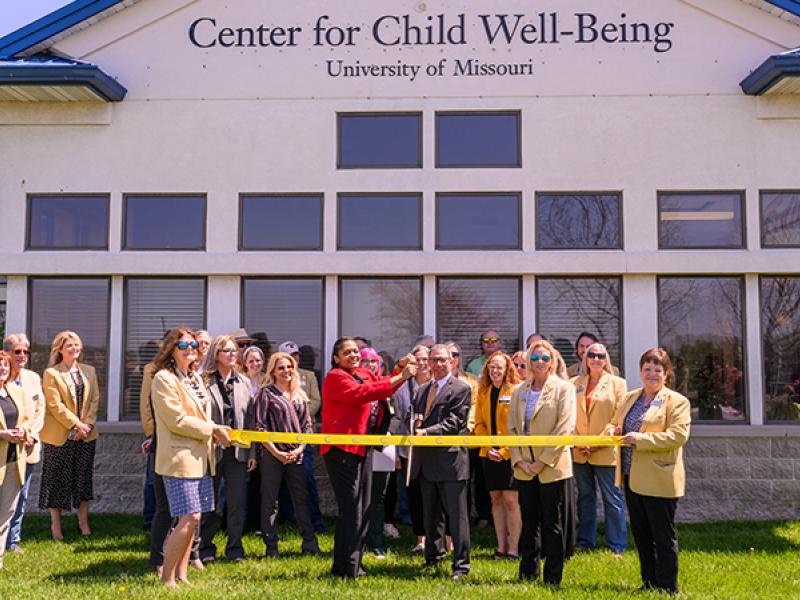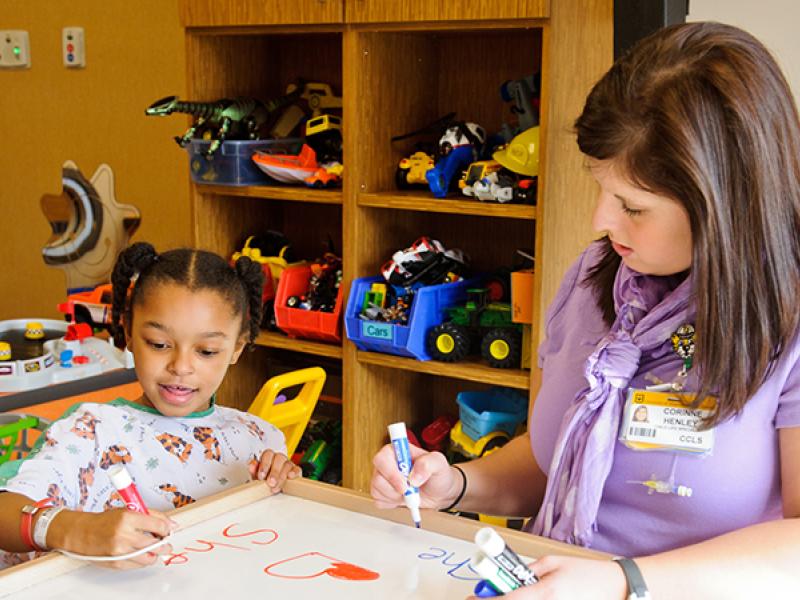Learn more about the Department of Psychiatry's research programs.
The Center for Child Well-being
Laine Young-Walker, MD, Chair of Department of Psychiatry
Jullie Allen, Center Director
Overview
The Center for Child Well-being is dedicated to advancing the social-emotional development and well-being of Missouri’s children.
The Center uses the public health model to reduce barriers to children’s mental health support by increasing the capacity of caregivers and professionals already in the lives of children across Missouri, ultimately increasing child well-being.
Primary Strategies
Increased Access to Care
The provision of statewide mental health support by the Center addresses the critical issue of timely access to mental health services, particularly in rural areas. Supports provided by the Center include training and consultation for professionals, including primary care, school staff, and social workers who work with children. Additionally, there is a limited amount of direct coaching and therapeutic services for children and families.
Workforce Development
Children’s mental health issues impact workforce stability on two fronts. Firstly, childcare programs and school systems are grappling with staffing challenges. At the same time, child expulsions from childcare or K-12 schools adversely affect caregivers' work capabilities, emphasizing the interconnectedness of child well-being and workforce stability. The Center’s programming increases the capacity of professionals working with children, reducing child expulsions, and increasing professionals’ job satisfaction.
Visit the current portfolio of
Center for Child Well-being programs.
Clinical and Translational Science Unit (CTSU)
Muaid Ithman, MD, Researcher
Overview
Dr. Ithman’s program of research is focused on advancing mental health care through rigorous clinical trials organized around testing the safety and efficacy of innovative treatments for mood disorders, including depression and anxiety.
Current trials explore a wide range of treatment modalities, including pharmacological interventions that investigate novel medications to help improve symptoms associated with mood disorders, as well as psychotherapy-based treatments that explore new therapeutic approaches. Current trials include the investigation of psychedelic-assisted therapy.
Our team of expert clinicians and researchers work closely with participants to ensure the highest standards of care and ethical conduct throughout each trial. If you are interested in learning more or participating in one of our clinical trials, please contact the Clinical and Translational Science Unit (CTSU)
For additional information
Email clinicalresearch@missouri.edu or call 573-882-4894.
Substance Use in Daily Life Lab
Andrea Wycoff, PhD, Director
Overview
The Substance Use in Daily Life (SUDL) Lab is led by Andrea Wycoff, PhD. The SUDL Lab uses daily-life assessment methods to understand how substance use relates to emotions, cognitions, and other experiences in individuals’ natural environments. Recent and ongoing research studies focus on how alcohol and cannabis use impact each other, and how use of one substance might influence recovery efforts for another substance. Overarching goals for this program of research are to better understand how people make decisions about substance use and identify productive treatment targets for individuals who are hoping to cut back.
For additional information
Health Innovation and Treatment Research Lab
Mary Beth Miller, PhD, Director
Overview
The Health Intervention and Treatment Research Lab (HIT Lab) is led by Mary Beth Miller, PhD. Research efforts are focused on how and why people change their health habits, including the study of drug and alcohol addiction, nutrition and sleep.
Recent studies have explored ways to improve the efficacy of addiction prevention and treatment in young people and in veterans.
Health Neuroscience Center (NHC)
Brett Froeliger, PhD, Director
Overview
The Health Neuroscience Center (HNC) is focused on integrating cognitive neuroscience, genetics, AI and clinical research to accelerate the discovery of new treatments for drug addiction in order to improve mental health and well-being. In order to learn more about the work being conducted in the HNC, or consider participating in one of our paid research studies, please visit the Health Neuroscience Center web site.
Contact us at
Predicting and controlling aggression on the part of psychiatric inpatients
Niels Beck, PhD, Program Coordinator
Overview
This research program is currently underway at the State Hospital at Fulton, where the department operates a forensic fellowship program. The Fulton campus includes a 200-bed, maximum-security forensic hospital, the only one of its kind in Missouri.
Niels Beck, PhD, coordinates this effort and studies are being conducted that involve abstracting data from hospital records of highly assaultive patients, including seclusion/restraint records, and tracking the types of medications used to control these behaviors. The goal is to develop medication algorithms for the management of aggressive behavior.
Additional investigations are underway that examine differences in staff/patient interactional patterns in highly assaultive vs. non-assaultive patient samples, the frequency of abuse and neglect in the family histories of these patient groups and a genetic study that targets several polymorphisms of genes thought to play a role in the development of hyper-emotionality and aggressive behavior.
Most recently, Dr. Beck has begun replicating and extending the results of his work at the State Hospital in Fulton to a variety of University Hospital Settings, including the ED, and the inpatient child/adolescent and adult psychiatric wards.
Residents in the second and fourth years, as well as forensic fellows, have an opportunity to work with Beck on these projects.
For additional information
Email: beckn@health.missouri.edu





